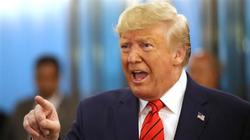 The Trump administration has announced an expansion of the Muslim travel ban - one of Trump’s signature policies which has been derided by critics as an attempt to ban Muslims from the US - to include six new countries.
The Trump administration has announced an expansion of the Muslim travel ban - one of Trump’s signature policies which has been derided by critics as an attempt to ban Muslims from the US - to include six new countries. RNA - Immigration restrictions will be imposed on: Nigeria, Eritrea, Tanzania, Sudan, Kyrgyzstan and Myanmar.
The latest iteration comes three years after President Donald Trump - in one of his first moves in office - signed the first Muslim travel ban, which caused chaos at airports and eventually landed at the Supreme Court.
As it turned out, Trump is now targeting African countries despite having a year previously revealed a "prosper Africa" strategy, which sought to re-engage the continent. However, as the new policy reveals, this was never pursued in serious solidarity for Africa and was only about American strategy. With the highlighted targeting of Nigeria, Trump has now dealt a serious blow to one of their most successful relationships on the continent.
On a diplomatic and economic level, Nigeria is fast becoming the most important country in Africa. With a population of 190 million, it is often touted as "an economy of the future" and is anticipated to become an engine of global economic growth. With its primary export being oil, the United States sits as Nigeria's highest provider of Foreign Direct Investment, with most of it being cantered in the petrochemical sector.
With the United States having released their "Prosper Africa" policy in late 2018, a doctrine is largely emerging from the fact that Washington had turned against China as a "strategic competitor", one would assume logically that the administration would continue to place emphasis on diplomacy with Nigeria and look for opportunities to expand investment, not least because the Nigeria-China relationship has also grown in tandem.
However, the Trump administration's domestic and foreign policy outlooks more than often prove to be contradictory. With this so-called pivot to Africa being largely insincere in practice, based as a reaction to other competitors than a genuine cause for concern for the continent, it cannot neutralize the anti-migrant populist-nationalism rooted at the heart of the administration.
With the election looming this year, Trump is inevitably going to care more about his own domestic standing and voter base than issues in Africa, and an extremely tough position on immigration has long been one of his core priorities. As a result, the option to extend the racially motivated travel ban inevitably "trumps" any foreign policy preferences.
According to Fars News Agency, the diplomatic consequences of such a move will be significant. The move is a slap in the face for Nigeria and a number of other African countries, which will damage America's soft power and appeal, as well as make it more challenging for the two countries to do two-way business. It sends out a negative message that will consolidate the fact that the United States is an unreliable partner and is prejudiced against Africans, which ironically serves to contradict Trump’s entire "prosper Africa" strategy in the first place.
In this case, his newest travel bans represent a poorly thought out strategic blunder. At the heart of the White House's foreign policy, the aggressive push for "America First" and appeal to racial anxieties contradicts sharply with the equally assertive belief that the country ought to reassert its hegemony against perceived challengers.
Still, any interest it held in Africa was merely an extension of the latter, than a serious end in and of itself. It is painfully obvious Trump has little empathy for African people. Thus, as the election comes calling, he turns to his base and, without a second thought, alienates the continent.
847/940